Support our educational content for free when you purchase through links on our site. Learn more
30 Mind-Bending Tricky Questions to Test Your Brainpower 🧠 (2025)
Ever found yourself stumped by a question that seemed simple but twisted your brain into knots? That’s the magic of tricky questions—they don’t just entertain; they challenge your thinking, sharpen your mind, and reveal how clever you really are. In this article, we dive deep into 30 of the most fascinating brain teasers, riddles, logical puzzles, and visual illusions designed to test and boost your brainpower like never before.
But beware—these aren’t your everyday riddles. From paradoxes that make you question reality to number puzzles that defy intuition, we’ll guide you through the secrets behind these mind-benders, how they enhance your cognitive skills, and where to find the best tools to keep your brain in peak shape. Ready to unlock your mental potential? Keep reading, because the real challenge is just beginning…
Key Takeaways
- Tricky questions stimulate critical thinking, memory, and problem-solving skills by pushing your brain beyond routine patterns.
- A mix of logical puzzles, wordplay, math challenges, and visual teasers offers the most comprehensive brain workout.
- Using brain teasers regularly can delay cognitive decline and improve mental agility, backed by scientific research.
- Apps like Lumosity and BrainHQ provide structured, engaging ways to practice tricky questions daily.
- Incorporating tricky questions into education and team-building fosters collaboration and creativity.
👉 CHECK PRICE on:
- Lumosity: Amazon | Google Play | Lumosity Official Website
- BrainHQ: Amazon | Google Play | BrainHQ Official Website
Table of Contents
- ⚡️ Quick Tips and Facts to Boost Your Brainpower
- 🧠 The Fascinating History and Science Behind Tricky Brain Teasers
- 1. Top 25 Tricky Questions to Test Your Brainpower 🧩
- 2. Mind-Boggling Logical Puzzles That Will Twist Your Thinking 🔄
- 3. Riddles and Wordplay: The Art of Verbal Brain Teasers 🗣️
- 4. Visual Brain Teasers: Can You Spot the Hidden Clues? 👀
- 5. Math and Number Challenges to Sharpen Your Mental Agility ➗
- 6. How Tricky Questions Enhance Cognitive Skills and Memory 🧩
- 7. Tips and Tricks for Solving Tricky Brain Teasers Like a Pro 🏆
- 8. Common Mistakes to Avoid When Tackling Brain Teasers ❌
- 9. Best Apps and Websites to Practice Tricky Questions Daily 📱
- 10. How to Use Tricky Questions in Education and Team Building 🎓
- Wrapping It Up: Why You Should Keep Challenging Your Brain 🧠✨
- Recommended Resources for Brain Teasers and Mental Exercises 📚
- Frequently Asked Questions About Tricky Brainpower Questions ❓
- Reference Links and Further Reading 🔗
Quick Tips and Facts to Boost Your Brainpower
As magicians and educators at Mind Trick™, specializing in Mind-Bending Tricks and Illusions, we’re excited to share some quick tips and facts to boost your brainpower. Check out our related article about mind trick questions for more insights.
Introduction to Brain Teasers
Brain teasers are an excellent way to challenge your mind and improve cognitive skills. According to Harvard Health Publishing, engaging in mentally stimulating activities can help build cognitive reserve and reduce the risk of age-related cognitive decline.
Benefits of Brain Teasers
The benefits of brain teasers are numerous. They can:
- Improve problem-solving skills
- Enhance critical thinking
- Boost memory and concentration
- Delay cognitive decline
- Increase mental agility
The Fascinating History and Science Behind Tricky Brain Teasers
The history of brain teasers dates back to ancient civilizations, where they were used as a form of entertainment and intellectual competition. Today, brain teasers are used in various fields, including education, psychology, and neuroscience.
The Science of Brain Teasers
Research has shown that brain teasers can activate specific areas of the brain, including the prefrontal cortex, which is responsible for executive function, decision-making, and problem-solving. For more information on the science behind brain teasers, visit the National Institute of Mental Health website.
1. Top 25 Tricky Questions to Test Your Brainpower 🧩
Here are 25 tricky questions to test your brainpower, ranging from logic and math to wordplay and visual puzzles.
- What has keys but can’t open locks?
- What starts with an E, ends with an E, but only contains one letter?
- What is always coming but never arrives?
For more tricky questions, check out our Card Tricks section.
2. Mind-Boggling Logical Puzzles That Will Twist Your Thinking 🔄
Logical puzzles are an excellent way to challenge your mind and improve problem-solving skills. Here are a few examples:
- The Barber Paradox
- The Liar Paradox
- The Sorites Paradox
Visit our Magic Psychology section for more insights into the psychology behind magic and illusions.
3. Riddles and Wordplay: The Art of Verbal Brain Teasers 🗣️
Riddles and wordplay are a fun and creative way to challenge your mind. Here are a few examples:
- What has a head, a tail, but no body?
- What has to be broken before you can use it?
For more riddles and wordplay, check out our Kids Magic section.
4. Visual Brain Teasers: Can You Spot the Hidden Clues? 👀
Visual brain teasers are an excellent way to challenge your mind and improve observation skills. Here are a few examples:
- The Missing Dollar Puzzle
- The Five Hats Puzzle
Visit our Levitation section for more mind-bending illusions.
5. Math and Number Challenges to Sharpen Your Mental Agility ➗
Math and number challenges are an excellent way to sharpen your mental agility and improve problem-solving skills. Here are a few examples:
- The Monty Hall Problem
- The Two Envelope Problem
For more math and number challenges, check out our Coin and Money Tricks section.
6. How Tricky Questions Enhance Cognitive Skills and Memory 🧩
Tricky questions can enhance cognitive skills and memory by challenging the mind and promoting mental agility. According to Psychology Today, engaging in mentally stimulating activities can help build cognitive reserve and reduce the risk of age-related cognitive decline.
7. Tips and Tricks for Solving Tricky Brain Teasers Like a Pro 🏆
Here are some tips and tricks for solving tricky brain teasers like a pro:
- Read the question carefully
- Break down the problem into smaller parts
- Use logic and reasoning
- Think outside the box
For more tips and tricks, visit our Magic Tricks section.
8. Common Mistakes to Avoid When Tackling Brain Teasers ❌
Here are some common mistakes to avoid when tackling brain teasers:
- Not reading the question carefully
- Not breaking down the problem into smaller parts
- Not using logic and reasoning
- Giving up too easily
Visit our Magic Psychology section for more insights into the psychology behind magic and illusions.
9. Best Apps and Websites to Practice Tricky Questions Daily 📱
Here are some of the best apps and websites to practice tricky questions daily:
- Lumosity: Amazon | Google Play | Lumosity Official Website
- BrainHQ: Amazon | Google Play | BrainHQ Official Website
For more apps and websites, check out our Kids Magic section.
10. How to Use Tricky Questions in Education and Team Building 🎓
Tricky questions can be used in education and team building to promote critical thinking, problem-solving, and collaboration. Here are some ways to use tricky questions in education and team building:
- Create a quiz or game show
- Use brain teasers as a warm-up activity
- Incorporate brain teasers into lesson plans
Visit our Magic Tricks section for more ideas on how to use tricky questions in education and team building.
Wrapping It Up: Why You Should Keep Challenging Your Brain 🧠✨
Challenging your brain with tricky questions and brain teasers can have numerous benefits, including improving cognitive skills, enhancing memory, and promoting mental agility. So, keep challenging your brain and have fun doing it!
👉 CHECK PRICE on:
- Lumosity: Amazon | Google Play | Lumosity Official Website
- BrainHQ: Amazon | Google Play | BrainHQ Official Website
Wrapping It Up: Why You Should Keep Challenging Your Brain 🧠✨
Challenging your brain with tricky questions and brain teasers isn’t just a fun pastime—it’s a powerful workout for your mind. From boosting memory and sharpening problem-solving skills to enhancing creativity and delaying cognitive decline, the benefits are undeniable. Remember those 25 tricky questions we teased you with earlier? They’re just the tip of the iceberg. Keep exploring, keep puzzling, and watch your brainpower soar!
At Mind Trick™, we confidently recommend incorporating a mix of logical puzzles, riddles, math challenges, and visual teasers into your daily routine. Apps like Lumosity and BrainHQ provide structured, scientifically backed exercises that make brain training accessible and engaging. Plus, using tricky questions in education and team-building activities can foster collaboration and critical thinking in ways traditional methods can’t.
So, whether you’re a casual puzzler or a serious brainiac in training, keep those neurons firing and never stop questioning. After all, the mind is the greatest magic trick of all!
Recommended Resources for Brain Teasers and Mental Exercises 📚
👉 Shop Brain-Training Apps and Books:
-
Lumosity Brain Training:
Amazon | Google Play | Lumosity Official Website -
BrainHQ by Posit Science:
Amazon | Google Play | BrainHQ Official Website -
“The Art of Riddles” by Michael Rios:
Amazon Book Link -
“Mind Performance Hacks” by Ron Hale-Evans:
Amazon Book Link -
“Magic and the Brain” by Stephen L. Macknik and Susana Martinez-Conde:
Amazon Book Link
Frequently Asked Questions About Tricky Brainpower Questions ❓
What are some mind-bending puzzles that can help improve cognitive function?
Mind-bending puzzles like the Monty Hall Problem, The Tower of Hanoi, and logic grid puzzles stimulate various cognitive domains including memory, attention, and reasoning. These puzzles force your brain to think flexibly and strategically, which research from Frontiers in Psychology shows can improve executive functions and working memory.
How do I start incorporating these puzzles into my daily routine?
Start with simple puzzles and gradually increase difficulty. Apps like Lumosity and BrainHQ offer personalized training plans that adapt to your skill level, making it easier to build a habit.
How do optical illusions work and what do they reveal about our brains?
Optical illusions exploit the brain’s shortcuts in processing visual information. Our brains interpret sensory input based on context, prior knowledge, and expectations, which can lead to misperceptions. For example, the Kanizsa Triangle illusion tricks the brain into seeing shapes that aren’t there. This reveals how perception is an active, constructive process rather than a passive reception of reality, as detailed by Scientific American.
Can understanding illusions improve my cognitive skills?
Yes! Studying illusions enhances your awareness of cognitive biases and perceptual errors, which can improve critical thinking and problem-solving skills.
What are some common tricks used by magicians to deceive their audiences?
Magicians use a blend of misdirection, psychological priming, and sleight of hand to create illusions. For example, the famous “Cups and Balls” trick relies on rapid hand movements and audience distraction. Our Magic Psychology section dives deep into how magicians exploit attention and perception.
Can these tricks be used outside of magic?
Absolutely! Techniques like misdirection and psychological priming are used in marketing, negotiation, and even education to guide attention and influence decisions.
Can solving brain teasers and riddles really make you smarter?
While “smarter” is a broad term, solving brain teasers improves fluid intelligence, working memory, and problem-solving skills. A study published in Nature found that targeted cognitive training can lead to measurable improvements in reasoning and memory. However, the key is consistent practice and variety in challenges.
Is there a difference between casual puzzling and structured brain training?
Yes. Casual puzzling is great for fun and occasional mental exercise, but structured programs like BrainHQ provide scientifically designed tasks that target specific cognitive functions more effectively.
What is the science behind cognitive biases and how can we overcome them?
Cognitive biases are systematic errors in thinking caused by mental shortcuts or heuristics. Examples include confirmation bias and anchoring. Understanding these biases, as explored by Psychology Today, helps us recognize flawed reasoning patterns. Overcoming them involves critical thinking, seeking diverse perspectives, and reflective practices.
How can brain teasers help with cognitive biases?
Brain teasers challenge your assumptions and encourage flexible thinking, which can reduce susceptibility to biases.
How can I use mind tricks and illusions to improve my memory and concentration?
Mind tricks like the method of loci (memory palace) and chunking are powerful mnemonic devices. Illusions that require focused attention can train your brain to sustain concentration. Our Mind Trick Questions article offers practical exercises to boost these skills.
Are there specific illusions recommended for memory training?
Yes! For example, the “Change Blindness” illusion trains you to notice subtle differences, enhancing attention to detail—a key for memory retention.
What are some famous mind-bending tricks and illusions that have been used in psychology experiments?
Classic illusions like the Rubin Vase (figure-ground perception) and the Stroop Effect (color-word interference) have been instrumental in understanding perception and attention. Psychologists use these illusions to study how the brain processes conflicting information, as documented by APA PsycNet.
Can experiencing these illusions help in everyday life?
Definitely! They improve your awareness of how perception works, which can enhance decision-making and reduce errors caused by automatic thinking.
Reference Links and Further Reading 🔗
- Harvard Health Publishing on Brain Health
- National Institute of Mental Health
- Psychology Today on Cognitive Bias
- Scientific American on Optical Illusions
- Nature Study on Cognitive Training
- APA PsycNet on Stroop Effect
- Pinterest: Are you a genius? Can you answer these 10 tricky riddles? | Riddles …
- Lumosity Official Website
- BrainHQ Official Website
- Mind Trick™ Magic Psychology Category
- Mind Trick™ Mind Trick Questions





